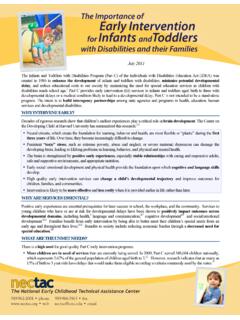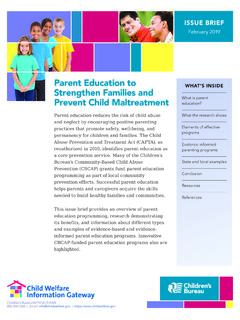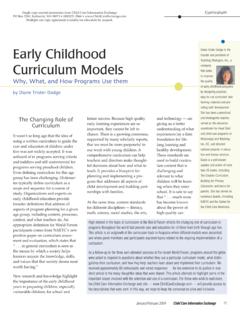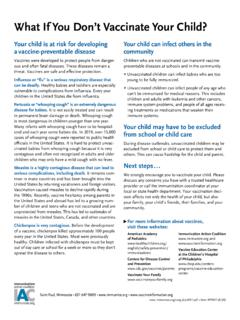Transcription of Effective Preschool Curricula and Teaching Strategies
1 PATHWAYS TO EARLY SCHOOL SUCCESS ISSUE BRIEF NO. 2 Effective Preschool Curricula and Teaching Strategies Lisa Klein Jane Knitzer l September 2006 PATHWAYS TO EARLY SCHOOL SUCCESS ISSUE BRIEF NO. 2 Effective Preschool Curricula and Teaching Strategies by Lisa Klein and Jane Knitzer This issue brief explores lessons from research and practice about the role of intentional curriculum and professional development and supports for teachers in closing the achievement gap in early literacy and math for low-income Preschool -age children. The aim is to help policymakers and administrators integrate this emerging knowledge more rapidly into their decisions to support teachers.
2 It is part of a series of reports from the National Center for Children in Poverty (NCCP) that address the question What will it take to ensure that young low-income children succeed in the early school years? In other issue briefs, NCCP has focused on the importance of Strategies to promote the social and emotional competencies of infants, toddlers, and preschoolers known to be foundational for Effective learning (see Pathways to Early School Success: Helping the most vulnerable Infants, Toddlers, and their Families, and Resources to Promote Social and Emotional Health and School Readiness in Young Children and Families A Community Guide, as well as other publications in the series: Promoting the Emotional Well-Being of Children and Families at ).
3 AUTHORSLisa Klein is Principle of Hestia Advising and was formerly the Vice-President of Early Education at the Kauffman Knitzer, , is Director at NCCP and Clinical Professor of Population and Family Health at Columbia University s Mailman School of Public Health. She has contributed many important studies on how public policies can promote the healthy development of low-income children and better support families, particularly those who are most authors wish to thank the participants at the meeting in November 2005 who generously gave their time and shared their wisdom, experience, and insight to inform this brief.
4 We also greatly appreciate the comments made by Rachel Chazan-Cohen, Herb Ginsburg, Susan Landry, Martha Moorehouse, Bob Pianta, Barbara Wasik, and Anne Wolf who reviewed initial drafts of the document. We also want to thank Jana Martella and the Council of Chief State School Officers and Marty Zaslow and Child Trends for sharing their ideas during the planning of both the meeting and the brief. And as always, we are grateful to our funders, Ruth Mayden and Lisa Kane, of the Annie E. Casey Foundation, without whose support the meeting and the brief would not have been possible. But we also want to thank them for their steady commitment to the achievement and success of young low-income children and their families.
5 Our appreciation too, to the NCCP staff, in particular to Meredith Willa for assistance transcribing the meeting discussions, to Carole Oshinksy for her tireless editing of the brief, and Telly Valdellon for her layout and production 2006 by the National Center for Children in PovertyThe National Center for Children in Poverty (NCCP) is the nation s leading public policy center dedicated to promoting the economic security, health, and well-being of America s low-income families and children. Founded in 1989 as a division of the Mailman School of Public Health at Columbia University, NCCP is a nonpartisan, public interest research Center for Children in Poverty Effective Preschool Curricula and Teaching Strategies 3 TABLE OF CONTENTS Executive Summary.
6 4 Introduction .. 7 How This Issue Brief is Organized .. 7 Section I: Setting the Context .. 8 Key Principles About Effective Early Learning Strategies .. 8 Four Challenges .. 10 Why a Special Focus on Curriculum and Teaching Strategies to Improve Early Learning Outcomes for Low-Income Children? .. 13 Section II: Stretching the Early Education Paradigm .. 14 Strategy 1: Intentional Curriculum .. 14 Strategy 2: Professional Development and Effective Teacher Supports .. 19 Teacher Supports: What We are Learning About the Best Way to Help Teachers Deliver Intentional Curriculum and Effective Practice in the Classroom.
7 22 Section III: Expanding the Knowledge Base .. 24 Evaluating Early Education Learning Strategies .. 24 Evaluating State Preschool Programs .. 26 Section IV: The Role of Local-Level Leadership .. 29 Section V: Take-Home Messages, Implications, and Recommendations for the Field .. 32 Conclusion .. 35 Endnotes .. 36 Boxes, Tables, and Figures Box 1: Joint Position Statement on Curriculum .. 14 Box 2: Characteristics of a High-Quality Intentional Curriculum .. 15 Box 3: Structural Quality versus Process Quality Research .. 18 Box 4: Classroom Assessment Scoring System (CLASS) Constructs & Scales.
8 18 Box 5: Evaluations of Selected Prekindergarten Programs .. 27 Table 1: Verbal Interactions of Children 10 Months to Age 3 Years, by Socioeconomic Status .. 11 Figure 1: Academic Abilities of Entering Kindergarteners by Family Income .. 12 Figure 2: Four-Year-Olds in Immigrant Families Enrolled in Pre-K/Nursery School, by Parents Country of Origin, 2000 .. 13 Appendix A: Meeting Participants .. 394 Effective Preschool Curricula and Teaching Strategies National Center for Children in PovertyEXECUTIVE SUMMARY High quality early learning is like a life jacket for low-income kids.
9 They need the life-preserver; whereas middle and upper-income kids already know how to swim and are not dependent on this to get ahead. Jean Layzer, ABT Associates and NCCP Meeting Participant This issue brief, based on a meeting of a group of distinguished researchers, educators, and poli-cymakers convened by the National Center for Children in Poverty (NCCP) explores lessons from research and practice about the role of an intentional curriculum and professional devel-opment and supports for teachers in closing the achievement gap for low-income Preschool age children. The aim is to take stock of emerging knowledge about how to increase low-income children s achievement in early literacy and early math and to explore the implications for how administrators and policymakers can best integrate this knowledge into their decision-making.
10 A special focus on curriculum and Teaching Strategies in Preschool programs is important for two reasons. First, many low-income children in early learning settings fall behind early and remain very much behind their peers in reading and math. Second, we are learning that clos-ing the achievement gap depends greatly on providing teachers with the professional develop-ment and supports that can help them more effectively promote early literacy and early math in the context of nurturing and emotionally supportive classrooms. Take-Home Messages The research in this issue brief shows that low-income children make gains in early literacy and early math when high-quality Preschool programs include an intentional curriculum and provide Effective teacher professional development and supports.

















